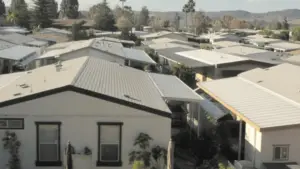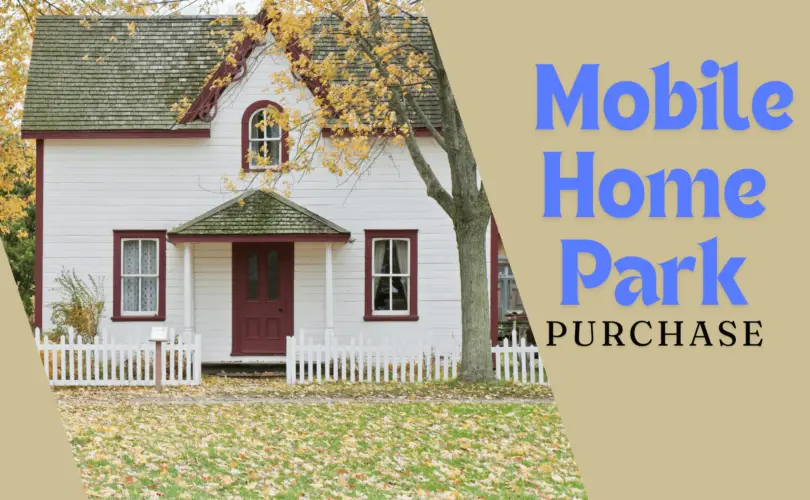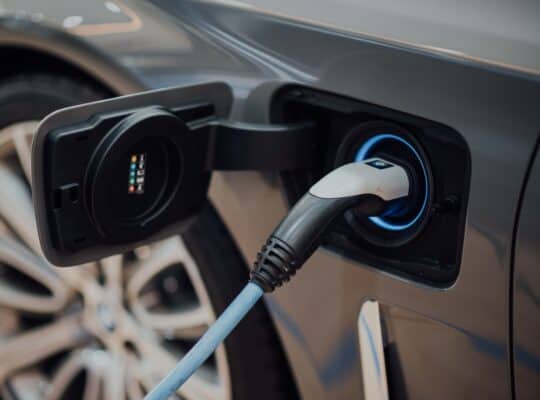For people seeking stable income and long-term growth, mobile home parks are an attractive investment. The allure lies in their potential for high returns and the relatively low level of competition when compared to other real estate investments. With everything having a catch, what would you do if you did not have enough capital to invest? How would you buy a mobile home park with no money?
Why Invest in Mobile Home Parks
Among the major attractions of investing in mobile home parks is the potential for stable cash flow. Unlike traditional rental properties where tenants rent both the dwelling and the land, tenants in mobile home parks own their homes and only rent the land (pad or lot as it is commonly referred to). As a result, tenants get to enjoy reduced maintenance burden and associated costs, steady rental income since the rent payments are often lower, and low turnover rates because as a tenant, one is more likely to remain in place.
With the demand for affordable housing being high, mobile homes offer a viable and economical solution for many people and families. Such homes are affordable, in comparison with traditional housing options. They are also accessible to a broader range of people, inclusive of those with limited financial resources. During periods of economic downturns and housing crises, mobile home parks experience heightened interest and occupancy rates as people seek cost-effective living arrangements.

Currently, the supply of mobile home parks is inherently limited because of various factors, which tend to drive up the value of existing parks. Many municipalities impose stringent zoning regulations that restrict the development of new mobile home parks. Such regulations are influenced by concerns regarding property values, community aesthetics, and strain on infrastructure and end up preserving the value of existing ones. The potential for new park development is also limited by the scarcity of land in desirable areas.
Compared to other real estate markets, mobile home parks have less competition from institutional investors. This makes them to become an attractive option for individual investors. Institutional investors often have an eye on mainstream asset classes like multifamily apartments, office buildings, and retail centers. Such investors also perceive mobile home parks to be less glamorous.
How to Buy a Mobile Home Park with No Money
When you lack upfront capital, you have to develop a critical mindset and approach to financing. In the process, you have to adopt creative financing which entails the use of non-traditional techniques to fund the investment. Concerning how to buy a mobile home park with no money, there are five (5) creative options that you can consider. These are:
- Seller Financing
- Partnerships and Joint Ventures
- Lease with Option to Purchase
- Private Money Lenders
- Crowdfunding
Seller Financing
Seller financing is one of the most effective ways to purchase a mobile home park with no money down. In this arrangement, the seller acts as the lender, allowing you to pay for the property over time rather than requiring a lump sum upfront. This method is especially useful if you lack the capital or traditional financing options. Here’s a deeper dive into how seller financing works and how you can make it work for you:
- Negotiation:
- The first step is to convince the seller to finance the deal. Approach this by understanding the seller’s needs and motivations. For instance, some sellers might prefer seller financing to avoid the hefty tax burden of receiving a large lump sum all at once.
- Emphasize the benefits to the seller, such as receiving regular payments with interest, potentially securing a higher overall sale price due to the extended payment plan, and retaining some control over the property until it’s fully paid off.
- Be prepared to present a solid business plan that outlines your ability to manage the property effectively and ensure timely payments.
- Terms:
- Once the seller is on board, it’s crucial to agree on terms that suit both parties. This includes:
- Interest Rate: Discuss and agree on a fair interest rate. Typically, this might be higher than traditional bank loans due to the higher risk for the seller.
- Repayment Schedule: Decide on the frequency of payments (monthly, quarterly, etc.) and the amount per installment. Ensure that the rental income from the mobile home park can cover these payments comfortably.
- Duration of the Loan: Set a reasonable period for the loan, which could range from a few years to a decade or more, depending on the agreement.
- Once the seller is on board, it’s crucial to agree on terms that suit both parties. This includes:
- Down Payment:
- Although this guide focuses on acquiring property with no money down, some sellers may still require a small down payment as a sign of commitment.
- Negotiate this amount to be as low as possible. You can also propose alternative forms of collateral if the seller insists on a down payment. For example, offering personal assets or another property as security can help mitigate the seller’s risk and reduce or eliminate the need for a cash down payment.
Partnerships and Joint Ventures
Partnering with someone who has the financial resources but lacks the expertise or time can be a win-win situation. This method involves finding a partner willing to invest capital in exchange for a share of the profits. Here’s how to structure a successful partnership:
- Find a Partner:
- Look for potential partners within your network or through real estate investment groups. Attend industry events, join online forums, and leverage social media to connect with investors.
- When pitching the potential of mobile home park investments, highlight the stability and profitability of this asset class, emphasizing the demand for affordable housing.
- Value Proposition:
- Clearly outline what you bring to the table. This could include market knowledge, management skills, and the ability to find lucrative deals.
- Emphasize your experience, reliability, and track record (if applicable) to build trust and confidence with potential partners.
- Equity Split:
- Agree on an equity split that reflects each partner’s contribution. Typically, the partner providing the capital receives a larger share of the profits. For example, a common arrangement might be a 70/30 or 60/40 split, favoring the capital investor.
- Ensure that both parties feel the split is fair to maintain a positive working relationship.
- Legal Agreements:
- Draft a comprehensive partnership agreement detailing roles, responsibilities, profit sharing, and exit strategies. This document should cover:
- Investment Amounts: Specify the amount each partner is investing.
- Profit Distribution: Clearly outline how profits will be divided.
- Decision-Making Authority: Define who has the authority to make major decisions regarding the property.
- Exit Strategies: Include clauses for how the partnership will handle scenarios like selling the park, buying out a partner, or dealing with disputes.
- Draft a comprehensive partnership agreement detailing roles, responsibilities, profit sharing, and exit strategies. This document should cover:
Lease with Option to Purchase
A lease option allows you to lease the mobile home park with the option to buy it at a later date. This strategy provides time to generate income and potentially save for a down payment. Here’s how to implement this method:
- Lease Agreement:
- Negotiate a lease agreement with the park owner. Ensure the lease terms are favorable and that the rental income from the park covers the lease payments.
- This agreement should also include maintenance responsibilities, allowing you to manage the park effectively and enhance its value during the lease period.
- Option Fee:
- An option fee grants you the right to purchase the property in the future. Negotiate this fee to be as low as possible or spread out over the lease term. The option fee is usually non-refundable but can often be applied towards the purchase price if the option is exercised.
- Purchase Terms:
- Agree on the purchase price and the timeframe within which you can exercise the option to buy. Ensure that the price is locked in, protecting you from market price increases.
- The timeframe should be long enough to allow you to improve the property’s financial performance and secure traditional financing or another creative financing option.
Related Post: Are Mobile Homes a Good Investment for Rental Property
Private Money Lenders
Private money lenders are individuals or groups willing to lend money for real estate investments. These lenders can be family members, friends, or real estate investors looking for higher returns. To secure funds from private lenders:
- Build a Network:
- Attend real estate investment meetings, seminars, and online forums to connect with potential private lenders. Networking events and real estate investment clubs are excellent places to meet these individuals.
- Maintain a professional online presence through platforms like LinkedIn, where you can showcase your expertise and connect with potential lenders.
- Pitch Your Plan:
- Present a well-researched business plan showcasing the mobile home park’s potential returns. Highlight your expertise, management strategy, and the security of their investment.
- Include detailed financial projections, market analysis, and risk mitigation strategies in your pitch to build confidence in your plan.
- Negotiation:
- Negotiate favorable terms, including the interest rate, repayment schedule, and any profit-sharing agreements. Private lenders typically seek higher interest rates than traditional banks, but terms can be more flexible.
- Ensure that the repayment terms align with the park’s cash flow to avoid financial strain.
Crowdfunding
Crowdfunding platforms allow you to pool funds from multiple investors to finance your mobile home park purchase. Here’s how to utilize crowdfunding:
- Choose a Platform:
- Select a reputable real estate crowdfunding platform that specializes in commercial real estate investments. Platforms like Fundrise, RealtyMogul, and CrowdStreet are popular choices.
- Ensure the platform has a track record of successful campaigns and a large investor base.
- Create a Campaign:
- Develop a compelling campaign that outlines the investment opportunity, projected returns, and your experience. Use high-quality visuals, detailed financial projections, and testimonials to enhance your campaign.
- Be transparent about the risks involved and your strategies for mitigating them.
- Marketing:
- Actively market your campaign through social media, email lists, and real estate investment communities to attract potential investors. Utilize platforms like Facebook, LinkedIn, and Twitter to reach a broader audience.
- Engage with potential investors by responding to questions and providing updates on the campaign’s progress.

Due Diligence and Evaluation
While buying a land or property, never complete the transaction without a due diligence. This is because you might end up losing your money. Doing due diligence helps you to avoid any potential pitfalls and ensures a sound investment. During the evaluation process, you get to identify issues that have the potential of affecting the value of the property and your ability to effectively manage it.
Below are possible areas to focus on:
Physical Inspection
Professional Inspector: Hire a professional inspector who specializes in mobile home parks. Their expertise will help uncover hidden issues that could become costly problems.
- Utilities: Check the condition and compliance of utilities such as water, sewer, and electrical systems. Inspect the infrastructure for any signs of deterioration, leaks, or outdated equipment.
- Roads and Common Areas: Evaluate the condition of internal roads, sidewalks, and common areas. Poorly maintained roads can lead to safety hazards and high repair costs. Common areas should be well-kept to attract and retain tenants.
- Homes and Lots: Inspect the condition of the mobile homes if they are included in the sale. Assess the overall maintenance of individual lots and the ease of access to each unit.
Financial Records
- Rent Rolls: Review the rent rolls to understand the current occupancy rate, rental income, and payment history of tenants. This will give you an insight into the park’s cash flow stability.
- Profit and Loss Statements: Analyze the profit and loss statements for the past few years. Look for trends in income and expenses, and identify any anomalies or irregularities.
- Tax Returns: Verify the park’s tax returns to ensure the reported income matches the financial statements. This can help detect any discrepancies or hidden liabilities.
- Operating Expenses: Scrutinize all operating expenses, including utilities, maintenance, insurance, and property management fees. Ensure they are reasonable and reflect the park’s actual operating costs.
Legal Considerations
- Zoning Regulations: Confirm that the park complies with current zoning regulations. Check if there are any pending zoning changes that could impact the property.
- Environmental Laws: Assess whether the park meets all environmental laws and regulations. Investigate past environmental issues and ensure there are no ongoing compliance problems.
- Local Ordinances: Review local ordinances that could affect the park’s operation, such as rent control laws, tenant rights, and eviction procedures.
- Lease Agreements: Examine existing lease agreements for any unfavorable terms or clauses. Ensure that they comply with local laws and provide the flexibility you need to manage the park effectively.
- Tenant Histories: Review the tenant histories to identify any patterns of non-payment, frequent complaints, or other issues that could affect the park’s stability.
Market Trends
- Demand and Supply: Analyze the demand for mobile home spaces in the area. Consider factors like population growth, employment rates, and housing affordability.
- Comparable Sales: Look at recent sales of comparable mobile home parks to understand the market value and potential appreciation.
- Economic Conditions: Assess the economic conditions in the area, including major employers, economic growth, and infrastructure development. A strong local economy can support higher occupancy rates and rental income.
- Future Developments: Investigate any planned developments or changes in the area that could impact the park, such as new housing projects, commercial developments, or infrastructure improvements.
Negotiating the Purchase
In any purchase, negotiations have to take place as a way of ensuring the involved parties get what they want or an equivalent. Effective negotiation is key to acquiring a mobile home park with no money down. Here are some negotiation tips to help you secure a favorable deal:
- Build Rapport:
- Establish Relationship: Establish a positive relationship with the seller. Take the time to understand their motivations and needs. This can help you tailor your proposal to address their concerns.
- Trust and Communication: Build trust through open and honest communication. Show that you are serious, knowledgeable, and committed to making the deal work.
- Creative Offers:
- Multiple Options: Present multiple offers to the seller, each with different financing structures such as seller financing, lease options, or partnerships. Highlight the benefits of each option to the seller, such as continued income stream, tax advantages, or reduced management responsibilities.
- Flexibility: Be prepared to adjust your offers based on the seller’s feedback and changing circumstances. Flexibility can make your proposal more attractive and increase the chances of acceptance.
- Leverage Information:
- Due Diligence Findings: Use the information gathered during due diligence to negotiate a fair price and favorable terms. Highlight any issues discovered during inspections or financial reviews to justify your offer.
- Market Comparisons: Leverage comparable sales data to support your valuation of the park. Show the seller how your offer aligns with current market conditions.
- Stay Flexible:
- Adaptability: Be open to adjusting your offer based on the seller’s feedback and changing circumstances. This might involve modifying payment schedules, interest rates, or other terms to meet the seller’s needs.
- Win-Win Solutions: Aim for win-win solutions that satisfy both parties. By focusing on mutual benefits, you can create a cooperative atmosphere that facilitates successful negotiations.
Final Remarks
Investing in mobile home parks offers stable income and long-term growth potential, thanks to high returns, steady cash flow, and low competition. Even without upfront capital, you can leverage creative financing methods like seller financing, partnerships, lease options, private money lenders, and crowdfunding to acquire a park. Due diligence is crucial—inspect the property, review financial records, ensure legal compliance, and analyze market trends. Effective negotiation, building rapport, presenting creative offers, and staying flexible can help secure a favorable deal. With persistence and strategic management, owning a mobile home park can become a profitable reality.








